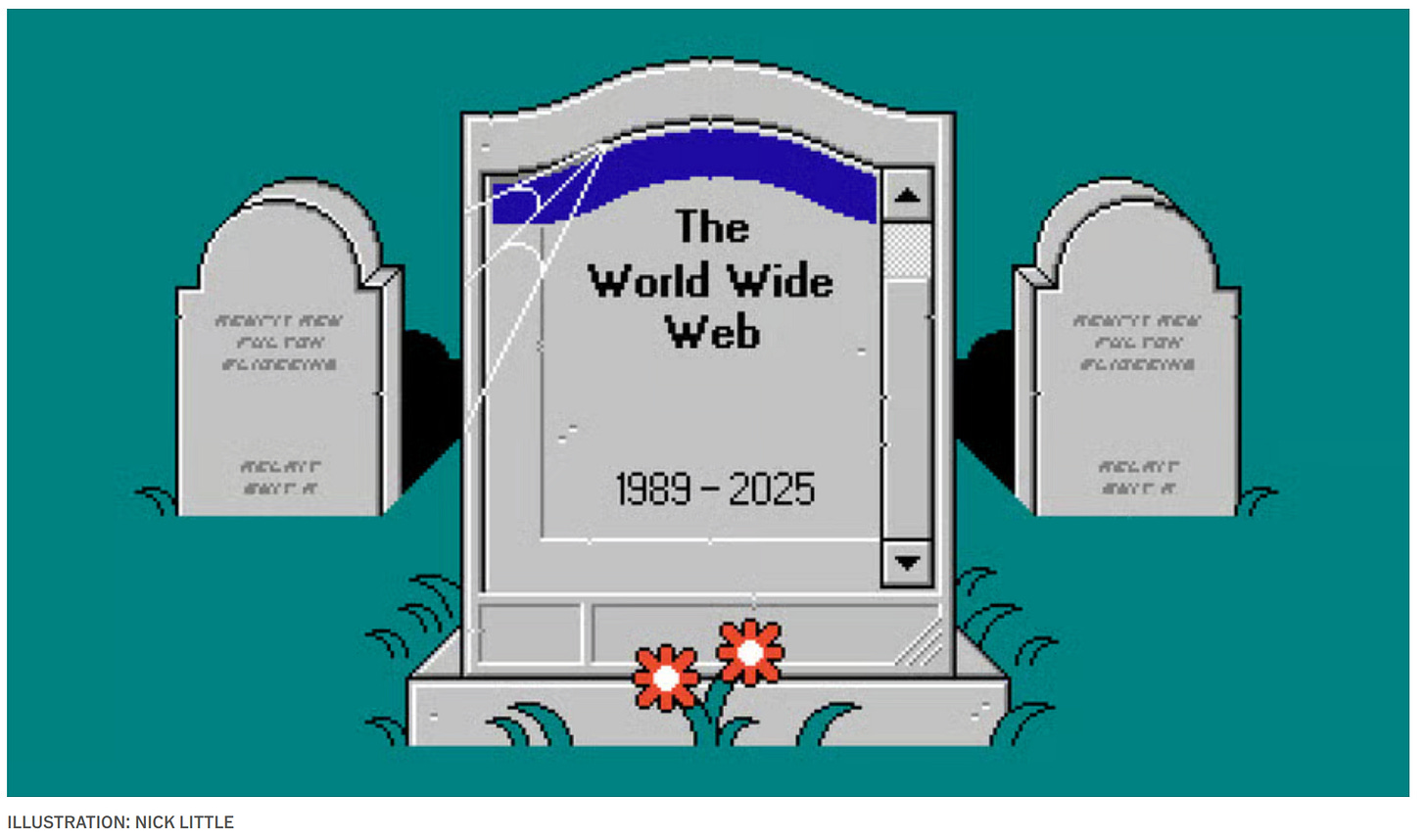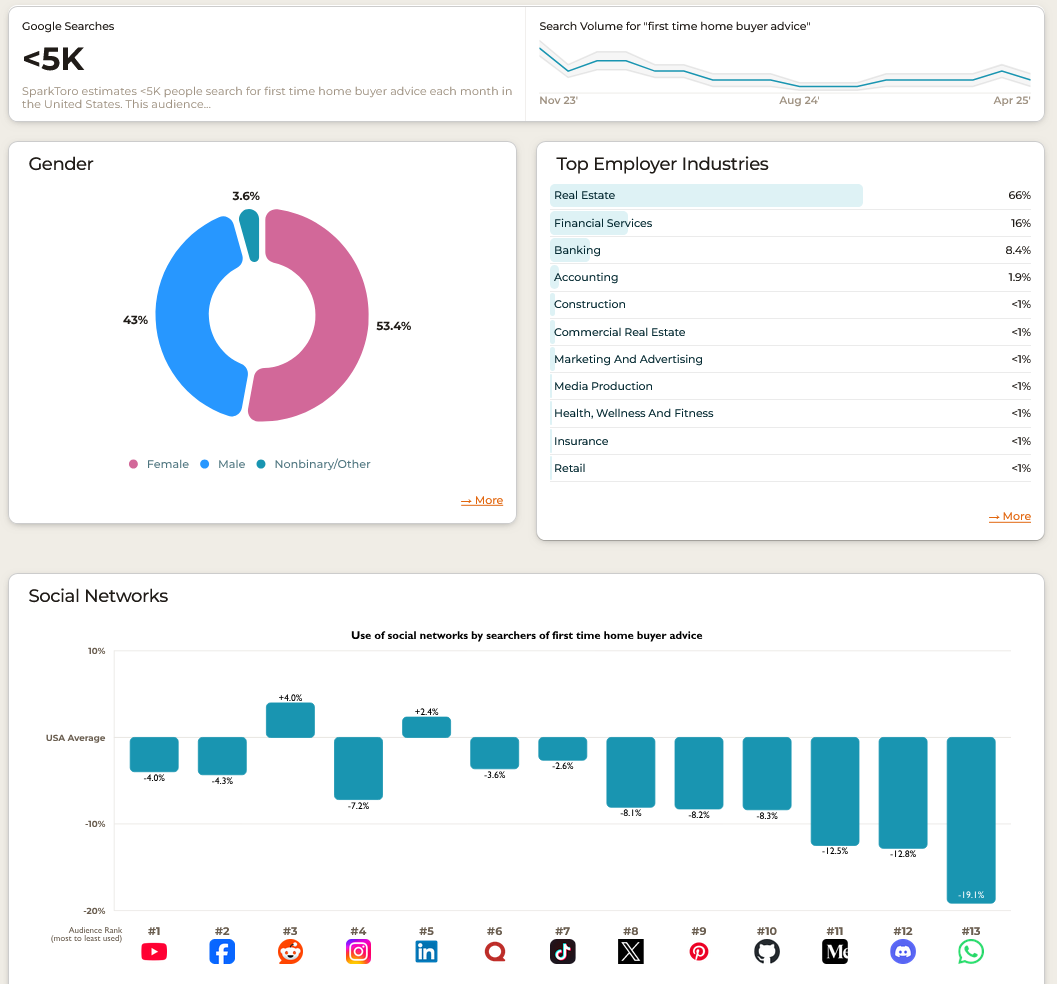Daily Grind July 21, 2025: Is AI Killing the Internet? Plus Ryan Holiday and Holding on to Old Beliefs
Welcome to Tech's Morning Newsletter: One headline, one page of a great book, and one question to start your day.
Hello!
Welcome to The Daily Grind for Monday, July 21, 2025.
Sorry for the late post today. I spent the weekend in Denver playing in the Ultimate Frisbee Masters Nationals tournament. Woolly Mammoth took 3rd Place and earned a bid to Worlds in 2026!
Now we’re back are back and we’re sticking with a theme from last week: AI and the Media. Today’s post looks at the impact of AI on search traffic, and whether it’s a killer or a savior.
Let’s get into it!
📰 One Headline: Will AI kill Internet? Or save it?
Last week, The Economist released an article about AI’s impact on the Internet, and especially the content creators that feed it.
On the surface, it doesn’t look good.
Internet traffic has been declining for years, even pre-dating the launch of ChatGPT in 2022. Rand Fishkin, founder of Moz and Sparktoro, has been the key bell-ringer on this issue, trying to warn companies that internet traffic is no longer an opportunity worth pursuing.
When Internet traffic dries up, so does advertising revenue, the de facto business model of the Web. As more consumers turn to AI tools to answer their daily questions, content creators are desperately seeking ways to get their fair share of the pie.
The largest media companies are pursuing a “wooing and suing” strategy, according to The Economist article. The are simultaneously striking licensing deals with some LLM companies while suing others when agreements can’t be reached.
But what about the rest of the content creators who don’t have the heft to make big tech come to the negotiating table?
Software providers like Cloudflaire may be able to help:
All of Cloudflare’s new customers will now be asked if they want to allow AI companies’ bots to scrape their site, and for what purpose. Cloudflare’s scale gives it a better chance than most of enabling something like a collective response by content sites that want to force AI firms to cough up.
But that’s not all. Software intermediaries are also experimenting with ways to help content creators earn money when their sites are crawled by AI bots:
[Cloudflare] is testing a pay-as-you-crawl system that would let sites charge bots an entry fee. “We have to set the rules of the road,” says Mr Prince [Co-founder and CEO of Cloudflare], who says his preferred outcome is “a world where humans get content for free, and bots pay a tonne for it”.
Tolls on bots could be a lifeline for media companies large and small, whose content is crucial to AI companies—not just for training, but providing accurate answers to user queries.
Another new tool that shows promise is Tollbit, which raised $24 million in October 2024:
An alternative is offered by Tollbit, which bills itself as a paywall for bots. It allows content sites to charge AI crawlers varying rates: for instance, a magazine could charge more for new stories than old ones.
In the first quarter of this year Tollbit processed 15m micro-transactions of this sort, for 2,000 content producers including the Associated Press and Newsweek. [Emphasis mine]
Toshit Panigrahi, its chief executive, points out that whereas traditional search engines incentivise samey content—“What time does the Super Bowl start?”, for example—charging for access incentivises uniqueness. One of Tollbit’s highest per-crawl rates is charged by a local newspaper.
It’s hard to predict how tolls on bots will change the behavior of the LLM companies. I would expect Google, OpenAI, and Meta to fight back by simply skipping the sites that require a toll. There needs to be a critical mass of content sites requiring tolls to shift the leverage in their favor.
A large, established company like Cloudflare seems to have the best chance of reaching that critical mass.
What if the Internet is more than Search? The Case for AI as beneficial to the Web
We often conflate Internet and Search when it comes to conversations about AI. Yes, searches are down, but that doesn’t necessarily mean revenue, or even website traffic, has been impacted.
Dotdash Meredith [the parent company to brands like Food and Wine and People] says it has grown its overall traffic despite the drop in referrals from Google.
That’s because internet traffic patterns are changing, not drying up. According to research from Sparktoro, while search traffic is declining, interest in certain topics like first-time homebuying are rising on channels like Reddit.
Image: Research from Sparktoro. In the top-right graph, you see search queries for “first time home buyer advice” declining. In the chart at the bottom, you see the change in search across social channels, where Reddit and LinkedIn are growing.
The real opportunity for content providers and brands, according to Fishkin, is to build their brands where their customers already live: on Reddit, TikTok, LinkedIn, and ChatGPT.
“AI is gonna take your opportunity to get search traffic. It has done that for the last five years. It’s gonna keep doing it. The way to keep your job is to [focus on] what the business really wants to accomplish, which is almost certainly more customers, more sales, more revenue, not more traffic.”
The Internet isn’t dying—it’s changing. Media providers and content creators must change with it.
🔗 A Few Good Links
X: Windsurf shares details of bleak 48 hours after OpenAI deal fell through, key leaders poached
Techcrunch: After Raising Over $3 Million, Popular VC-Backed Beauty Brand Ami Colé is Shuttering
Techcrunch: Why Cartken Pivoted Its Focus from Last Mile Delivery to Industrial Robots
📚 One Page: The Obstacle is the Way by Ryan Holiday
Times of rapid change require flexibility and an obsessive focus on the end goal, not the means to which you get there.
Media and content companies—along with the rest of us—are in times of upheaval. Traditional sources of traffic and revenue are losing viability, yet most companies are still using search traffic as their key performance indicator.
The Obstacle is the Way is a book for trying times. I re-read it every year. It’s a reminder that life doesn’t get easier, you just get better at navigating it.
This page—with its anecdote about Samuel Zemurray—is one of my favorites:
WHAT’S RIGHT IS WHAT WORKS
The cucumber is bitter? Then throw it out.
There are brambles in the path? Then go around.
That’s all you need to know.
—MARCUS AURELIUSIn 1915, deep in the jungles of Central America, the rising conflict between two rival American fruit companies came to a head. Each desperately wanted to acquire the same five thousand acres of valuable land.
The issue? Two different locals claimed to own the deed to the plantation. In the no-man’s-land between Honduras and Guatemala, neither company was able to tell who was the rightful owner so they could buy it from them.
How they each responded to this problem was defined by their company’s organization and ethos. One company was big and powerful, the other crafty and cunning. The first, one of the most powerful corporations in the United States: United Fruit. The second, a small upstart owned by Samuel Zemurray.
To solve the problem, United Fruit dispatched a team of high-powered lawyers. They set out in search of every file and scrap of paper in the country, ready to pay whatever it cost to win. Money, time, and resources were no object.
Zemurray, the tiny, uneducated competitor, was outmatched, right? He couldn’t play their game. So he didn’t. Flexible, fluid, and defiant, he just met separately with both of the supposed owners and bought the land from each of them. He paid twice, sure, but it was over. The land was his. Forget the rule book, settle the issue.
This is pragmatism embodied. Don’t worry about the “right” way, worry about the right way. This is how we get things done.
Zemurray always treated obstacles this way. Told he couldn’t build a bridge he needed across the Utila River—because government officials had been bribed by competitors to make bridges illegal—Zemurray had his engineers build two long piers instead. And in between which reached out far into the center of the river, they strung a temporary pontoon that could be assembled and deployed to connect them in a matter of hours. Railroads ran down each side of the riverbank, going in opposite direction. When United Fruit complained, Zemurray laughed and replied: “Why, that’s no bridge. It’s just a couple of little old wharfs.”
Sometimes you do it this way. Sometimes that way. Not deploying the tactics you learned in school but adapting them to fit each and every situation. Any way that works—that’s the motto.
❓ One Question: What is one old belief that is holding you back from adapting?
The world changes, and we often struggle to accept that. We hold on to old beliefs—ways the world used to work, and ways we want the world to work—and it prevents us from adapting and thriving in the new reality.
So here is your question for today: What is an old belief about the world that is holding you back from adapting?
I will share one of mine: Since 2022, I have desperately wished that the world would wake up to the perils of short form, junk food content and embrace books again.
While I still believe in long-form, intentional content, I think we have passed the peak of book buying. In order for thoughtful, long-form writing to exist, the business model needs to adapt. That’s something I’m committed to working on at Damn Gravity.
🗳️ Wrap Up and Feedback:
That’s it for today! Sorry again for the late newsletter, but I hope it was still worthwhile. As always, please share your feedback:








For the last couple years I’ve all but stopped reading nonfiction. It’s partly a function of age —I’m past the self-help and/or business strategy stage of life for the most part. But also, great fiction has an emotional truth that is very rare in nonfiction.